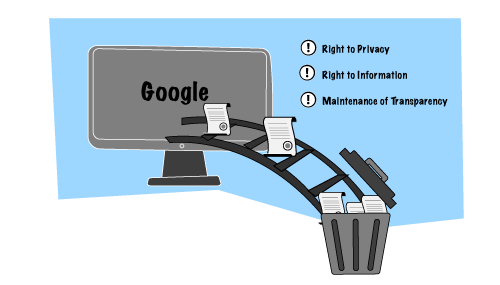The Right to be Forgotten

The Right To Be Forgotten
In April 2021, the Delhi High Court passed an interim order recognizing that the right to be “forgotten” is a part of the fundamental right to privacy. This interim order has been granted in the Jorawar Singh Mundy vs. Union of India and Ors., 2021 SCC OnLine Del 2306.
The ‘Mundy’ Case
A case was registered under the Narcotics and Psychotropic Substances Act 1985 (NDPS) against Mr. Jorawer Singh Mundy, an American citizen of Indian origin who had travelled to India in 2009. In 2011, the Trial court acquitted him. In 2013, the order acquitting him was upheld by the Delhi HC as well. Mr. Mundy was acquitted of all charges.
After returning to the U.S.A, Mr. Mundy claimed that he faced several challenges in securing job opportunities. He claimed he was unable to obtain any employment as any background check by potential employers would result in the cases appearing online on platforms like Google. Despite being acquitted, this put him at disadvantage, irreparable prejudice and social stigma.
In April 2021, he filed a writ petition in the Delhi High Court seeking removal of judgments passed in 2013 from platforms such as Google. In May 2021, an interim order as stated above was passed by the Delhi HC recognizing the right to be forgotten and directed Google and other legal websites to remove the case.
What is the right to be forgotten?
The right to be forgotten is the right for personal information available publicly to be removed from the internet, websites, search engines and any search databases once such information is no longer relevant or required.
Is there a law governing the right to be forgotten?
Presently, there is no law expressly governing the right to be forgotten.
In the K.S Puttasamy Vs Union of India and Ors (2017) 10 SCC 1 a Constitutional bench of the Supreme Court passed a landmark judgment recognizing “right to privacy” as a fundamental right.
In 2020, the Orissa High Court recognized that the “right to be forgotten” or right to be “deleted” is part of the Right to privacy. This observation was made in the Subhranshu Rout v. State of Odisha 2020 SCC OnLine Ori 878. The case pertained to removal of objectionable pictures and videos of a girl from social media.
Based on the above judgments, it can be interpreted that the right to freedom is part of the right to privacy. High Courts are taking notice of this right and are passing orders.
Internationally, reference to this right can be found in the judgment passed in the Google Spain case by the European Court of justice.
The right to be forgotten can become a law only when the Data Protection Bill 2019 is passed. The Bill contains provisions relating to protection of personal data of citizens / individuals and establishment of Data protection Authority to monitor the same. The Bill has been pending in the Parliament.
The Pandora’s box
The discussion on the right to be forgotten has opened up a pandora’s box. The overriding concern has been the thin line between right of privacy and the right of information and maintenance of transparency in judicial records. Previously decided cases / judgments cannot be erased off public domain by using the right to be forgotten as such cases may serve as precedence for future cases.
The right to be forgotten (including removal of details off internet and social media platforms) cannot be provided as a blanket right. Restriction of information has to be balanced with legal and statutory requirements of the sharing information in public domain. The judgment in the Puttaswamy case itself recognizes that the right to privacy is not an absolute right.
It can be presumed that the right to be forgotten may be granted by Courts after careful consideration of the facts of each case.
In the Mundy case, the Delhi HC granted interim relief for removal of case history from Google due to the adverse impact it on his career prospects and social life.
In the Subhranshu case, the Orissa HC granted relief on the ground that explicit sexual content, even if taken with the consent of the woman, cannot be uploaded on social media to harass and degrade the woman once the relationship is strained.
In the Puttaswamy case, the Apex Court categorically stated that an individual should be able to remove his personal data from public domain only when such data is (i) no longer relevant, (ii) is incorrect or (iii) serves no legitimate purpose.
The right to be forgotten cannot be exercised when data is necessary for (i)exercising freedom of expression and information (ii) public interest or (iii) legally required.
The right to be forgotten is to be exercised only when the balance between right to privacy of an individual is balanced with the right to information in public and maintenance of transparency in judicial records.

